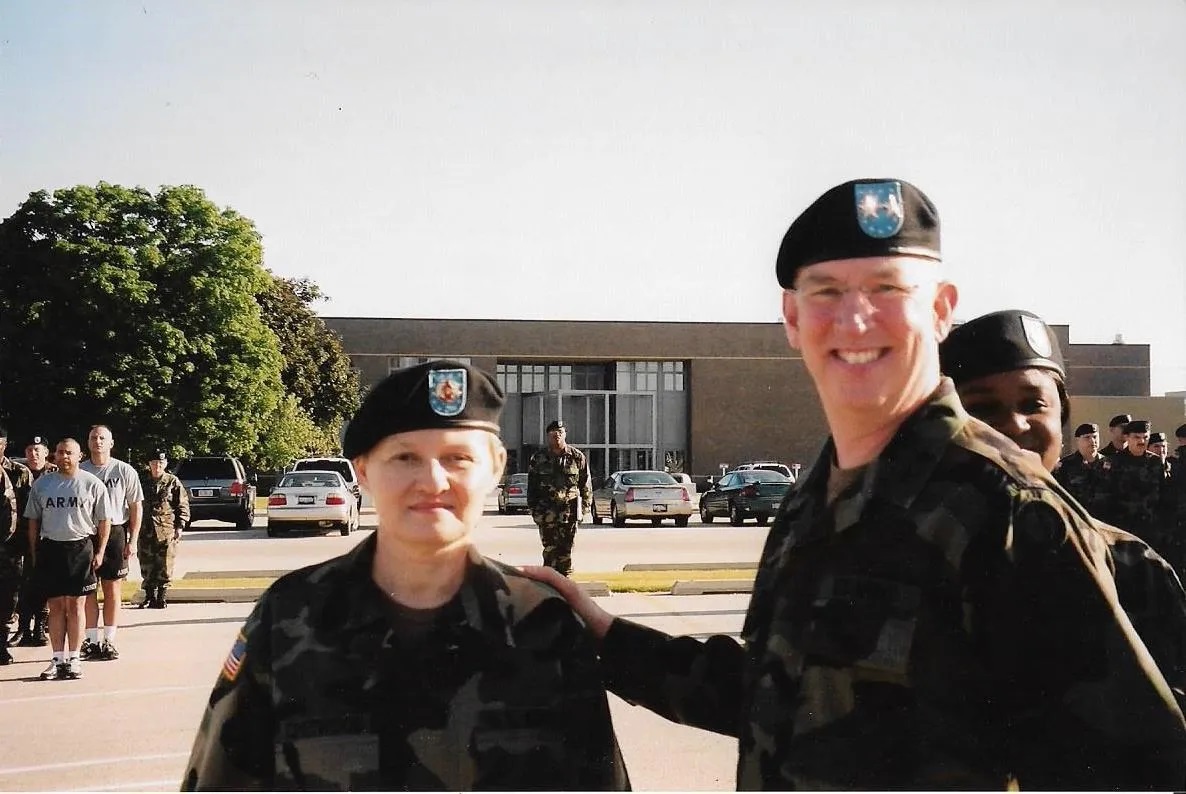What did you do the last time you saw a man or woman in uniform at the grocery store or a restaurant? Let’s take a moment this Memorial Day to ask: What’s the best way to thank a uniformed soldier or veteran? There are a few schools of thought. First, there are those who believe it could “trigger” an emotional reaction linked to trauma experienced in the line of duty. It may also be worth noting that veterans’ homecoming experiences are sometimes negative. For these reasons, is it best to simply remain quiet next time you see a uniformed serviceperson in public?
Thank You For Your Service
“The most recent time I thanked someone in uniform I was sitting at The Court Café here in Franklin, Indiana. I saw two uniformed women—it is a special thing to be female in the military, and they reminded me of myself when I was in the US Army. I decided I was going to pay for their meal. I asked the café to just let them know someone in the restaurant wanted to say ‘Thank you!”
–Norma Chitwood, Army Retired Sergeant Major turned Military One Source Provider at Kenosis

Expressing our gratitude with solid actions like these is the best way to thank military men and women in our community. Another good way to show gratitude is to actively educate ourselves on the challenges faced by military families during various phases of deployment. Take a look at what Military Families may go through every deployment cycle, and some tips for military families from Norma herself.
Norma notes that Camp Atterbury is so close to the Johnson County area and Operation Inherent Resolve currently is in pre-deployment, so most of the servicemen and women you see are likely to be Army. Norma shares her expertise as an Army veteran and Military OneSource Therapy Provider over these three phases.
Pre-Deployment
- Communication is key for the military family. It is important to plan a specific routine when the military spouse is deployed—for example, an understanding that the military spouse will call home Mondays and Fridays at 8:00 p.m.
- Explore options for phone plans. (Norma reports that, From Cuba to Kuwait, T-Mobile seems to work the best)
- Seek out military family support groups and other resources for military deployed families online ahead of time.
- Recordings of a deployed parent can be really great, especially singing a child’s favorite song.
- Resilience and family-preparedness comes from military spouses communicating as much as possible with the rest of the family.
- When talking to children, make sure they understand the importance of their parent’s decision to serve our country.
- The support and encouragement for the mission of the deployment from the non-deployed spouse/family member is vital to help accept the pending separation.
Deployment
- With one spouse gone, flexibility regarding ‘gender roles’ can really help.
- Deployment can actually bring some relief (the stress of the preparation period is over), though the rest of the family now face extra challenges. This comment came from a military wife whose husband has deployed multiple times.
- Military.com has tips to keep the military spouse connected with their kids. One of Norma’s favorites is to fill a jar with one piece of candy for every day until their parent returns. For example, maybe this means 300 Hershey’s Kisses. The child gets to eat a candy kiss each day the deployed parent is gone. As they see the amount of candy decrease in the jar, they see that Mommy or Daddy is coming home soon.
- Consider developing weekly meetings in your neighborhood with other peer military family connections. These individuals will understand your problems and will be able to offer unique support. Keep this support encouraging and uplifting for all.
Reunion
- Returning home and reunion is filled with excitement at first.
- Both spouses need to express appreciation of their partner’s efforts.
- Problems returning home are very common;
- Since the family learned to function without the returning parent, they may feel that they aren’t as needed anymore. (Of course, this isn’t true.)
- They come back with invisible wounds like PTSD and TBI, that could create secondary post traumatic stress endured by families. Invisible wounds can be much harder (compared to physical wounds-like a broken leg))for families to understand. Problems like these are more common in younger families, but can be managed through open and honest communication.
- Sometimes a deployed military member makes great friends while serving, then is separated from that camaraderie.
- They likely need time to warm back up. Rest assured, if the family was healthy initially, they can get it back. Many couples report growing much stronger and an increased marital closeness.
Thank The Military Spouse, Too
Norma urges us, “If you see their spouse and children—be sure to thank them too! It’s a sacrifice for the whole family.” Community support can be complemented with therapy to make a returning veteran’s transition much more comfortable.
Norma Chitwood is an experienced, specially trained provider of Military-One-Source services, and reminds all military families that “if you had it once, you can always get it back again”. Below are some additional resources for military families. From all of us at Kenosis Counseling, thank you for your service!
Resources
1) www.military-one-source.mil
Veterans Crisis Line: Suicide Prevention Hotline, Text & Chat
www.veteranscrisisline.net
Free, confidential support for Veterans in crisis and their families and friends. Call the Veterans Crisis Line at 1-800-273-8255 and Press 1 or text to 838255.
3) https://www.military.com/benefits/survivor-benefits/survivors-resource-list.html

